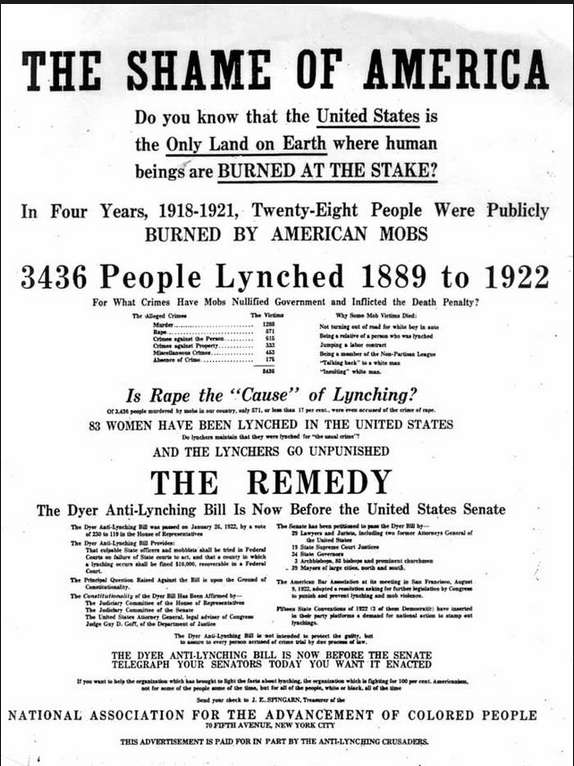This really is an important milestone in American history, and a long time coming.
Let me explain.
Let me explain.
https://twitter.com/kylegriffin1/status/1096099288780804096
More than a century ago, the NAACP established an Anti-Lynching Committee to record statistics on the epidemic of lynchings of African Americans and to press for legislative change.
Here's a page from their report in 1921, for instance:
Here's a page from their report in 1921, for instance:

The NAACP also sought to raise public awareness of lynchings, through public acts like this famous banner, which all too often flew outside the NAACP headquarters on Fifth Avenue in New York.
(This particular photo is from 1936)
(This particular photo is from 1936)

In Washington, the NAACP efforts initially focused on the anti-lynching bill first introduced by Rep. Leonidas Dyer (R-Missouri) in 1918.
The House passed a version in 1922, but it was killed by a filibuster by Southern Democrats in the Senate.
The House passed a version in 1922, but it was killed by a filibuster by Southern Democrats in the Senate.

By the mid-1930s, Dyer had lost his seat in Congress, but his anti-lynching cause continued, thanks to a new bill introduced in 1934 by Senators Edward Costigan (D-Colorado) and Robert Wagner (D-New York). 

Here's a section on the Costigan-Wagner bill from Ira Katznelson's fantastic FEAR ITSELF.
As you can see, when it became clear that the bill might split the Democratic Party and cost FDR the South in the 1936 election, the party as a whole moved to kill the bill.


As you can see, when it became clear that the bill might split the Democratic Party and cost FDR the South in the 1936 election, the party as a whole moved to kill the bill.



With Congress refusing to take action, lynchings continued across the South.
In 1937, a particularly gruesome lynching in Duck Hill, Mississippi -- which involved the use of a blowtorch to torture the two victims -- shocked the nation.
The story from the Chicago Defender:

In 1937, a particularly gruesome lynching in Duck Hill, Mississippi -- which involved the use of a blowtorch to torture the two victims -- shocked the nation.
The story from the Chicago Defender:


The story broke as Congress was considering yet another anti-lynching bill, this time sponsored by Rep. Joseph Gavagan (D-New York).
The brutal details of the Duck Hill lynching were read into the record during the debate, helping sway the Democratic House to pass it, 277-118.
The brutal details of the Duck Hill lynching were read into the record during the debate, helping sway the Democratic House to pass it, 277-118.

Democrats dominated the House -- it was 334 D, 88 R -- and so the fight over the bill was largely one waged inside their ranks.
For decades, southern conservative Democrats had stymied any action on civil rights, but now they came up short: 189 Dems voted for the bill, 115 no.
For decades, southern conservative Democrats had stymied any action on civil rights, but now they came up short: 189 Dems voted for the bill, 115 no.

The House was one thing; the Senate, another.
Southern Democrats waged a filibuster there for six long weeks.
"I believe in white supremacy," said Sen. Allen Ellender (D-Louisiana), "and as long as I am in the Senate, I expect to fight for white supremacy."
Southern Democrats waged a filibuster there for six long weeks.
"I believe in white supremacy," said Sen. Allen Ellender (D-Louisiana), "and as long as I am in the Senate, I expect to fight for white supremacy."

Sen. Josiah Bailey (D-NC) said the bill was "studiously cultivated by agitators ... for the purpose of introducing the policy of Federal interference in local affairs."
Southern Democrats would fight it. "I give you warning," he said, "no administration can survive without us."
Southern Democrats would fight it. "I give you warning," he said, "no administration can survive without us."
The Southern filibuster dragged on for six weeks, stalling everything in Congress and effectively holding the nation hostage.
Asked if they could keep it going until Christmas, Sen. Tom Connally (D-Texas) snorted "Why not?"
Asked if they could keep it going until Christmas, Sen. Tom Connally (D-Texas) snorted "Why not?"

Polls showed a strong majority in support of anti-lynching legislation that year across the country, with even a majority in the South.
But as long as Southern Democrats were able to abuse the Senate's rules, they were able to keep the bill -- or anything else -- from passing.
But as long as Southern Democrats were able to abuse the Senate's rules, they were able to keep the bill -- or anything else -- from passing.

But now today, more than eight decades later, the Senate has finally passed an anti-lynching law.
(The Senate did this in December too, but that bill was never taken up by the House. This one will surely be passed by the Democratic House and sent to Trump for his signature.)
(The Senate did this in December too, but that bill was never taken up by the House. This one will surely be passed by the Democratic House and sent to Trump for his signature.)
The fact that an anti-lynching law -- stymied from 1918 on -- will finally be passed a century later truly is historic.
But the fact that the three sponsors of the Senate bill are all African-Americans -- Booker (D-NJ), Harris (D-CA), and Scott (R-SC) -- is even more so.
But the fact that the three sponsors of the Senate bill are all African-Americans -- Booker (D-NJ), Harris (D-CA), and Scott (R-SC) -- is even more so.
• • •
Missing some Tweet in this thread? You can try to
force a refresh





